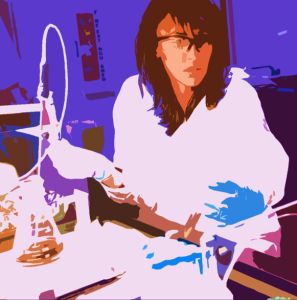Effective interpersonal interactions are crucial to all scientific enterprises. Yet most scientists, especially those in academia, have had little training in how to manage the nuanced and complex human dynamics that they must face in their professional lives. Recognizing and acknowledging differences, and practicing seeing others as complex humans and not just “a pair of hands” is difficult and often antithetical to how many people were trained.
The culture of the workspace
 If you visit any academic research department, you’ll see variations in culture between labs, largely reflecting the behaviors and values of the lab Principal Investigator (PI). In some, the benches are tidy and noise is minimal beyond the hum of the equipment. In others, the sink area is cluttered, autoclavable waste bins are overflowing, and music and loud conversations fill the room. But if you look closely, you might see someone working in the corner at a meticulously tidy bench, wearing ear buds to drown out the noise. It’s possible to work in an environment where the culture is a mismatch towards your own work habits, but it’s not always easy.
If you visit any academic research department, you’ll see variations in culture between labs, largely reflecting the behaviors and values of the lab Principal Investigator (PI). In some, the benches are tidy and noise is minimal beyond the hum of the equipment. In others, the sink area is cluttered, autoclavable waste bins are overflowing, and music and loud conversations fill the room. But if you look closely, you might see someone working in the corner at a meticulously tidy bench, wearing ear buds to drown out the noise. It’s possible to work in an environment where the culture is a mismatch towards your own work habits, but it’s not always easy.
A lab culture extends beyond tidiness and noise. Most departments have at least one lab where everyone seems to be working all the time, evenings and weekends included. Many PIs are explicit in their expectations that those working in their group work long hours. If those expectations are communicated before someone commits to working with them, and matches the goals of the student or postdoc, it can be a happy and productive working relationship.
But.
 Imagine this scenario. The PI is established, with no children or other dependents living with them. They own a house and have a good salary. Maybe they have some help with necessary domestic chores, like laundry and cleaning. They love their research and want to spend all their time pushing it forward at a fast pace. Sometimes this drive comes from passion, curiosity, and the desire to solve a perplexing problem. Sometimes there’s also an unhealthy dose of competitiveness and desire for personal glory mixed in – but the end goal is the same. More, more, more, faster, faster, faster is the lab status quo.
Imagine this scenario. The PI is established, with no children or other dependents living with them. They own a house and have a good salary. Maybe they have some help with necessary domestic chores, like laundry and cleaning. They love their research and want to spend all their time pushing it forward at a fast pace. Sometimes this drive comes from passion, curiosity, and the desire to solve a perplexing problem. Sometimes there’s also an unhealthy dose of competitiveness and desire for personal glory mixed in – but the end goal is the same. More, more, more, faster, faster, faster is the lab status quo.
Now imagine a new postdoc joins the lab who wasn’t aware of the lab culture. Their small salary barely covers their rent and other living expenses. They might have children or other dependents living with them and can’t afford much childcare or other domestic support.
What do you think is going to happen between the PI and postdoc? Can you envision an outcome in which both the PI and the postdoc are able to feel satisfied? If so, what needs to happen to reach that outcome?
There are many other ways in which problems can arise in a laboratory or work environment. Some problems can be resolved with simple strategies such as an agreed-upon set of expectations about work hours, record keeping, and lab chores.
Some issues are more difficult to resolve and go beyond work habits.
Each of us brings more to science than just our knowledge, skills, and enthusiasm. We’re all fully developed people who have our personal histories, values, and experiences that shape how we perceive the world and are perceived by others.
Being seen as our whole selves and having those selves acknowledged and respected is foundational to establishing an effective, productive relationship, especially one where one person holds a great deal of power over the other.
 Many scientists have identities that have been excluded from the dominant culture of science: women, first-generation scientists, people from the LGBTQ+ community, Black, Indigenous or Latine people, people with disabilities. People with identities historically excluded from science often have lived experiences of discrimination and harm that cause them to feel defensive, and sometimes skeptical about their ability to be successful.
Many scientists have identities that have been excluded from the dominant culture of science: women, first-generation scientists, people from the LGBTQ+ community, Black, Indigenous or Latine people, people with disabilities. People with identities historically excluded from science often have lived experiences of discrimination and harm that cause them to feel defensive, and sometimes skeptical about their ability to be successful.
Social scientists and psychologists have documented that scientists who perceive themselves as outsiders in STEM due to their cultural identities experience real, measurable negative impacts, but also that these impacts can be diminished by the supportive actions of their peers and supervisors.
Inclusive actions for individuals
How can a peer, PI, or other person with power and responsibility for others learn how to truly see others, including those they supervise, and ensure that their work environment is not interfering with their progress?
It takes humility, inquiry, and willingness.
Humility comes from self-awareness and recognizing how our life experiences have shaped how we perceive ourselves. It can be difficult to recognize that some of the things we are most proud of, such as our academic achievement, are not entirely of our own doing, but may have an element of “unearned privilege”. As examples, first-generation college students must navigate the hidden curriculum of higher education without parental input, and fully one quarter of faculty have a parent with a PhD. In other words, some people have an edge simply because of the family that they were born into.
Humility helps us to see that differences in others are not deficits, but can be strengths. For example, when I read a manuscript written by someone who was not brought up reading and speaking English, I commend them on their ability to communicate in a second or third language and strive to help them build on their skills.
Inquiry
Inquiry means educating ourselves about other people’s needs, cultures, and experiences. We should all be aware by now that holding a meeting at 5pm is likely to interfere with picking up children from daycare, yet it’s often left to parents to raise concerns. We should also be aware of significant religious or cultural events that affect our colleagues. Scheduling a Muslim student’s PhD defense during the fasting period of Ramadan is not okay, nor is giving a lecture in which every scientist who appears on screen is a white man. Tools are available to make our workspaces and communications accessible, and we should employ them. Resources are widely available through which we can learn about other cultures and histories, to raise our own cultural awareness.
Willingness
 Which brings us to willingness. Learning about and understanding the impacts of racism and social biases that affect people is not too difficult, and certainly a critical first step. Taking the next steps means changing behaviors, and, through collective efforts, changing systems. Individual actions start with a critical assessment of your teaching and mentoring practices. Are you using inclusive language? Have you removed processes that serve merely as gatekeepers? Are you letting those you supervise know that you value them and that they can trust you?
Which brings us to willingness. Learning about and understanding the impacts of racism and social biases that affect people is not too difficult, and certainly a critical first step. Taking the next steps means changing behaviors, and, through collective efforts, changing systems. Individual actions start with a critical assessment of your teaching and mentoring practices. Are you using inclusive language? Have you removed processes that serve merely as gatekeepers? Are you letting those you supervise know that you value them and that they can trust you?
Systemic change occurs when people with power use it to support the needs of those without power. Speak up when you see a problem. Is your search committee relying on word-of-mouth to advertise a position? Are the selection criteria clearly communicated and objective? Are funds and awards allocated equitably? Are ombuds and advocates available to mediate conflicts? Are efforts to support culturally aware mentoring, promote diversity, and teach inclusively recognized and rewarded in appointment, tenure, and promotion criteria?
Culturally aware mentorship
 For the best experiences for all, and the best outcomes of the research team, we should all develop cultural awareness, and particularly practice culturally aware mentorship and supervision.
For the best experiences for all, and the best outcomes of the research team, we should all develop cultural awareness, and particularly practice culturally aware mentorship and supervision.
Learning to be a culturally aware mentor requires the humility, inquiry, and willingness to change, as described above. A training program can provide resources, structures, and opportunities to practice in a supportive space.
Over the past few years, training opportunities in culturally aware mentorship have been developed and evaluated, but the trainings are not widely available, and/or are expensive. Therefore, we, representing the community of plant scientists through the ROOT & SHOOT research coordination network, are developing a cohort-based training program that we will own, facilitate, and provide at no charge to those who want to participate (see https://rootandshoot.org/mentoring-working-group/).
We anticipate recruiting the beta testers later this year and opening up the training to others in early 2025. Stay tuned for more information.

0 Comments